Jaehyuk Park
$\textit{Labor Space}$: A Unifying Representation of the Labor Market via Large Language Models
Nov 20, 2023Abstract:The labor market is a complex ecosystem comprising diverse, interconnected entities, such as industries, occupations, skills, and firms. Due to the lack of a systematic method to map these heterogeneous entities together, each entity has been analyzed in isolation or only through pairwise relationships, inhibiting comprehensive understanding of the whole ecosystem. Here, we introduce $\textit{Labor Space}$, a vector-space embedding of heterogeneous labor market entities, derived through applying a large language model with fine-tuning. Labor Space exposes the complex relational fabric of various labor market constituents, facilitating coherent integrative analysis of industries, occupations, skills, and firms, while retaining type-specific clustering. We demonstrate its unprecedented analytical capacities, including positioning heterogeneous entities on an economic axes, such as `Manufacturing--Healthcare'. Furthermore, by allowing vector arithmetic of these entities, Labor Space enables the exploration of complex inter-unit relations, and subsequently the estimation of the ramifications of economic shocks on individual units and their ripple effect across the labor market. We posit that Labor Space provides policymakers and business leaders with a comprehensive unifying framework for labor market analysis and simulation, fostering more nuanced and effective strategic decision-making.
People, Places, and Ties: Landscape of social places and their social network structures
Jan 12, 2021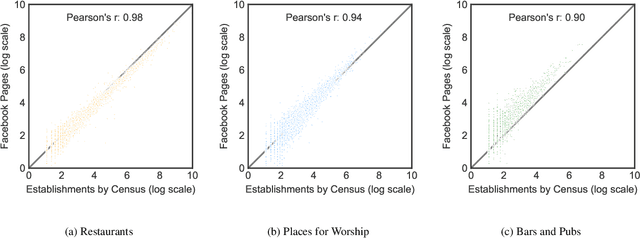
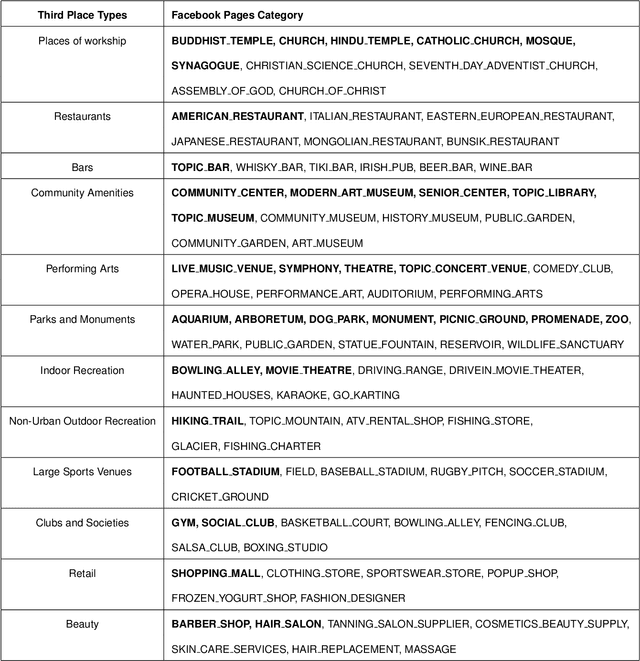
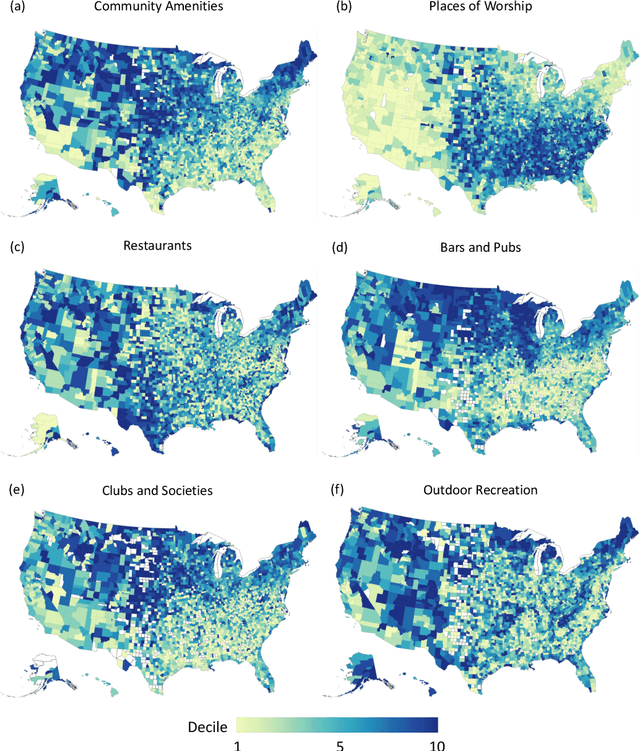
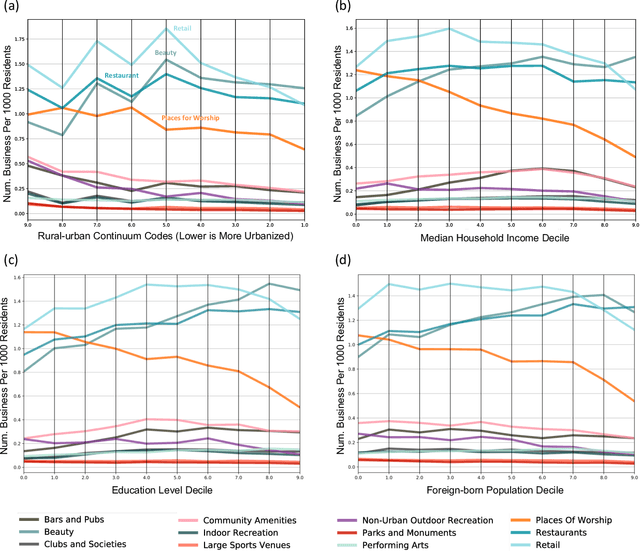
Abstract:Due to their essential role as places for socialization, "third places" - social places where people casually visit and communicate with friends and neighbors - have been studied by a wide range of fields including network science, sociology, geography, urban planning, and regional studies. However, the lack of a large-scale census on third places kept researchers from systematic investigations. Here we provide a systematic nationwide investigation of third places and their social networks, by using Facebook pages. Our analysis reveals a large degree of geographic heterogeneity in the distribution of the types of third places, which is highly correlated with baseline demographics and county characteristics. Certain types of pages like "Places of Worship" demonstrate a large degree of clustering suggesting community preference or potential complementarities to concentration. We also found that the social networks of different types of social place differ in important ways: The social networks of 'Restaurants' and 'Indoor Recreation' pages are more likely to be tight-knit communities of pre-existing friendships whereas 'Places of Worship' and 'Community Amenities' page categories are more likely to bridge new friendship ties. We believe that this study can serve as an important milestone for future studies on the systematic comparative study of social spaces and their social relationships.
Industrial Topics in Urban Labor System
Sep 18, 2020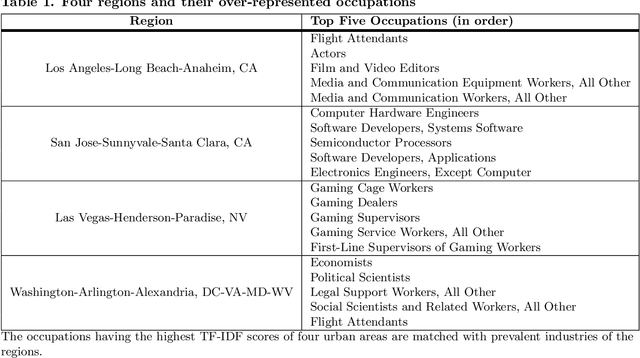
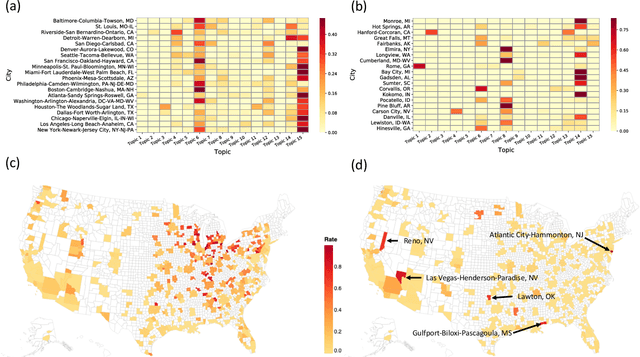
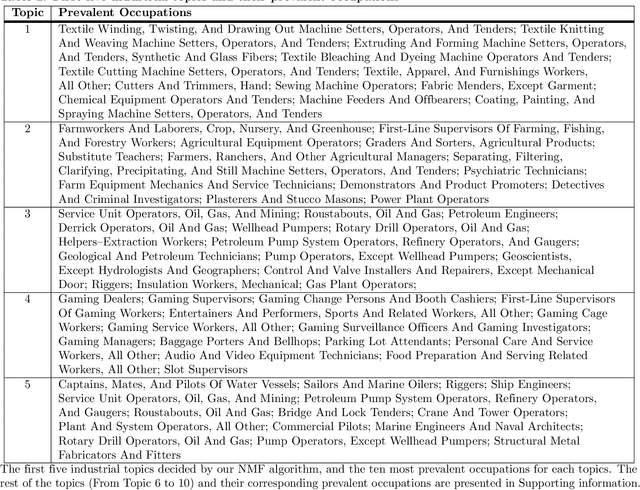
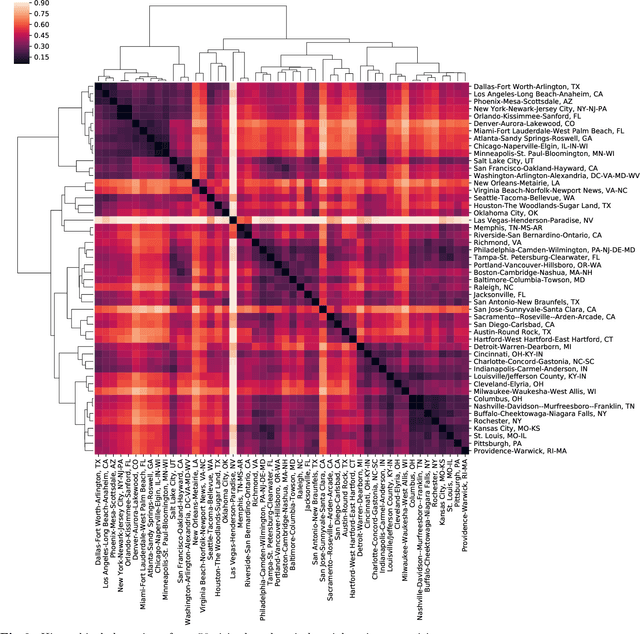
Abstract:Categorization is an essential component for us to understand the world for ourselves and to communicate it collectively. It is therefore important to recognize that classification system are not necessarily static, especially for economic systems, and even more so in urban areas where most innovation takes place and is implemented. Out-of-date classification systems would potentially limit further understanding of the current economy because things constantly change. Here, we develop an occupation-based classification system for the US labor economy, called industrial topics, that satisfy adaptability and representability. By leveraging the distributions of occupations across the US urban areas, we identify industrial topics - clusters of occupations based on their co-existence pattern. Industrial topics indicate the mechanisms under the systematic allocation of different occupations. Considering the densely connected occupations as an industrial topic, our approach characterizes regional economies by their topical composition. Unlike the existing survey-based top-down approach, our method provides timely information about the underlying structure of the regional economy, which is critical for policymakers and business leaders, especially in our fast-changing economy.
 Add to Chrome
Add to Chrome Add to Firefox
Add to Firefox Add to Edge
Add to Edge